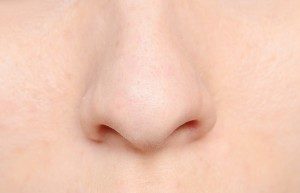 Recently some studies have found that a diminished sense of smell occurs in persons with mild cognitive impairment and Alzheimer's disease. Doctors have long observed that patients with Alzheimer's frequently complain that food doesn't taste good anymore (because they can't smell what they are eating). This is because odor signals from the nose are processed in areas of the brain that are among the first to be affected by Alzheimer's disease. It is thought that as dementia starts and progresses, the parts of the brain that distinguish odors start to deteriorate.
Recently some studies have found that a diminished sense of smell occurs in persons with mild cognitive impairment and Alzheimer's disease. Doctors have long observed that patients with Alzheimer's frequently complain that food doesn't taste good anymore (because they can't smell what they are eating). This is because odor signals from the nose are processed in areas of the brain that are among the first to be affected by Alzheimer's disease. It is thought that as dementia starts and progresses, the parts of the brain that distinguish odors start to deteriorate.
This is why various odor tests have been devised. One such odor test (used in the following study) is called "Sniffin Sticks", which tests for 16 odors such as orange, peppermint, leather, banana, garlic, rose, fish, and coffee. However, note that other degenerative brain diseases (including Parkinson's) can also affect odor detection, and the ability to smell can be diminished by smoking, certain head injuries, and even normal aging. From Medical Xpress:
Study confirms 'sniff test' may be useful in diagnosing early Alzheimer's disease
Tests that measure the sense of smell may soon become common in neurologists' offices. Scientists have been finding increasing evidence that the sense of smell declines sharply in the early stages of Alzheimer's, and now a new study from the Perelman School of Medicine at the University of Pennsylvania published today in the Journal of Alzheimer's Disease confirms that administering a simple "sniff test" can enhance the accuracy of diagnosing this dreaded disease. The sniff test also appears to be useful for diagnosing a pre-dementia condition called mild cognitive impairment (MCI), which often progresses to Alzheimer's dementia within a few years.
Roalf and his colleagues used a simple, commercially available test known as the Sniffin' Sticks Odor Identification Test, in which subjects must try to identify 16 different odors. They administered the sniff test, and a standard cognitive test (the Montreal Cognitive Assessment), to 728 elderly people. The subjects had already been evaluated by doctors at Penn with an array of neurological methods, and according to expert consensus had been placed in one of three categories: "healthy older adult," "mild cognitive impairment," or "Alzheimer's dementia." Roalf and his team used the results from the cognitive test alone, or combined with the sniff test, to see how well they identified subjects in each category.
As researchers report, the sniff test added significantly to diagnostic accuracy when combined with the cognitive test. For example, the cognitive test alone correctly classified only 75 percent of people with MCI, but that figure rose to 87 percent when the sniff test results were added. Combining the two tests also enabled more accurate identification of healthy older adults and those with Alzheimer's dementia. The combination even boosted accuracy in assigning people to milder or more advanced categories of MCI.
Prompted by prior studies that have linked a weakening sense of smell to Alzheimer's, doctors in a few larger dementia clinics already have begun to use smell tests in their assessments of elderly patients. Part of the reason the practice has not yet become common is that the tests that seem most useful take too long to administer.
